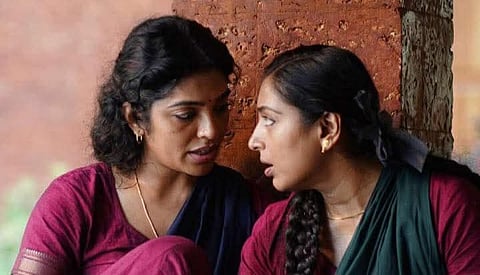

Backstage (Malayalam)
There is a quiet, almost poetic beauty in the way that Backstage, written and directed by Anjali Menon, explores the emotional landscape of its characters. As former friends Gowri (Padmapriya) and Kanya (Rima Kallingal) find their way back to each other, the pain of old wounds and the quiet hope of healing are palpable in the air. The scent of nostalgia lingers in every frame.
The short film, which is part of an eight-episode anthology called Yuva Sapno Ka Safar, follows the reunion of Gowri and Kanya, who were once inseparable as young performers at a classical dance school. Years have passed, and life has taken them in different directions, leaving behind unresolved tensions and silent distances. When they meet again, drawn back to the familiar world of their school, they are forced to confront the fragility of their bond, the pain of old misunderstandings, and the quiet longing that never truly left.
Gowri and Kanya, in the safe hands of Padmapriya and Rima, are the embodiment of girlhood bonds that often transcend time. Through them, Anjali gently explores this affection that time cannot sever, no matter how much it may try. The story, essentially, is not just between two people, but between what is, what was, and what could have been.
Backstage doesn't shy away from the messier parts of friendship, especially the quiet envy that can creep in between even the closest of friends. But rather than judging this, the film embraces it as part of being human. It shows that we are all, in some way, a little selfish first, before we are generous or forgiving. That's what makes Gowri and Kanya's bond so fragile and so real.
Anjali has always had a keen eye for the intricacies of human connection. Whether it's the affectionate chaos between cousins in Bangalore Days (2014), the quiet, aching bond between siblings in Koode (2018), or the tender solidarity among women in Wonder Women (2022), her stories pulsate with emotion. In Manjadikuru (2012), she beautifully explores nostalgia and the yearning to return to one's roots — a thread that runs subtly through Backstage as well.
Padmapriya gives a layered performance with a disarming innocence that makes Gowri deeply endearing. There's a childlike mischief that flickers through her expressions — a quiet naughtiness that hints at the girl she once was, full of dreams and playful rebellion. But beneath that charm lies a tender, almost naive sense of betrayal. It's the kind of innocent anger one carries when left behind by someone they loved deeply, without fully understanding why.
Rima, on the other hand, plays Kanya with a flair that borders on theatrical, slipping into the exaggerated grace and haughty airs of a celebrity. There’s humour in the facade she puts up, a self-awareness that makes those moments feel playful rather than arrogant. But behind all of it lies deep vulnerabilities and a quiet regret. The actor reveals this slowly, allowing glimpses of Kanya's weaknesses to shine through in stolen moments and unguarded glances.
The differences between the two central characters are stark, but together, their chemistry feels effortlessly organic, their real-life camaraderie seeping into their shared glances, lending an authenticity that makes their on-screen bond all the more moving. As trained dancers in real life, Padmapriya and Rima also bring a natural grace and authenticity to their performances.
George Korah brings delightful humour to the role of Manu, the school helper who is both endearing and comically lost in the world around him. Ann Saleem is charming as Kanya's assistant Nancy, and Gautam Narayan shines in his brief role as Arshad, the makeup man. Vanitha Krishnachandran and Sajitha Madathil also make brief yet notable appearances.
Like in several of Anjali’s other films, the characters in Backstage speak a cocktail of languages, including English, Malayalam, Tamil, and Hindi, making it a true multilingual mix. While the film briefly acknowledges why the characters are speaking English, the absence of subtitles is noticeable. Given the range of languages used, subtitles would have made the film more accessible and easier to follow for a wider audience.
One notable detail that has sparked controversy is the muting of the word "beef" in a lighthearted scene. This choice stands out even more considering Backstage is streaming on Waves, an OTT platform launched by Prasar Bharati, the Union government’s public broadcaster. The censorship, while seemingly minor, has led to conversations about the limits of creative freedom on state-backed platforms and the subtle pressures that may shape what stories can — or cannot — be told in full.
Overall, Backstage treads a familiar territory, and the story unfolds in a way that’s largely predictable. But that’s precisely where its charm lies. The film knows what it wants to be — a tender, reflective slice of life — and it stays true to that intention without overreaching.
Backstage is the kind of short film that makes the world feel just a little softer, a little kinder. In a time when reality often feels dystopian, the film reminds us of the quiet beauty in friendship, reconciliation, and letting go.
Watch the trailer for Yuva Sapno Ka Safar:
Disclaimer: This review was not paid for or commissioned by anyone associated with the film. Neither TNM nor any of its reviewers have any sort of business relationship with the film’s producers or any other members of its cast and crew.